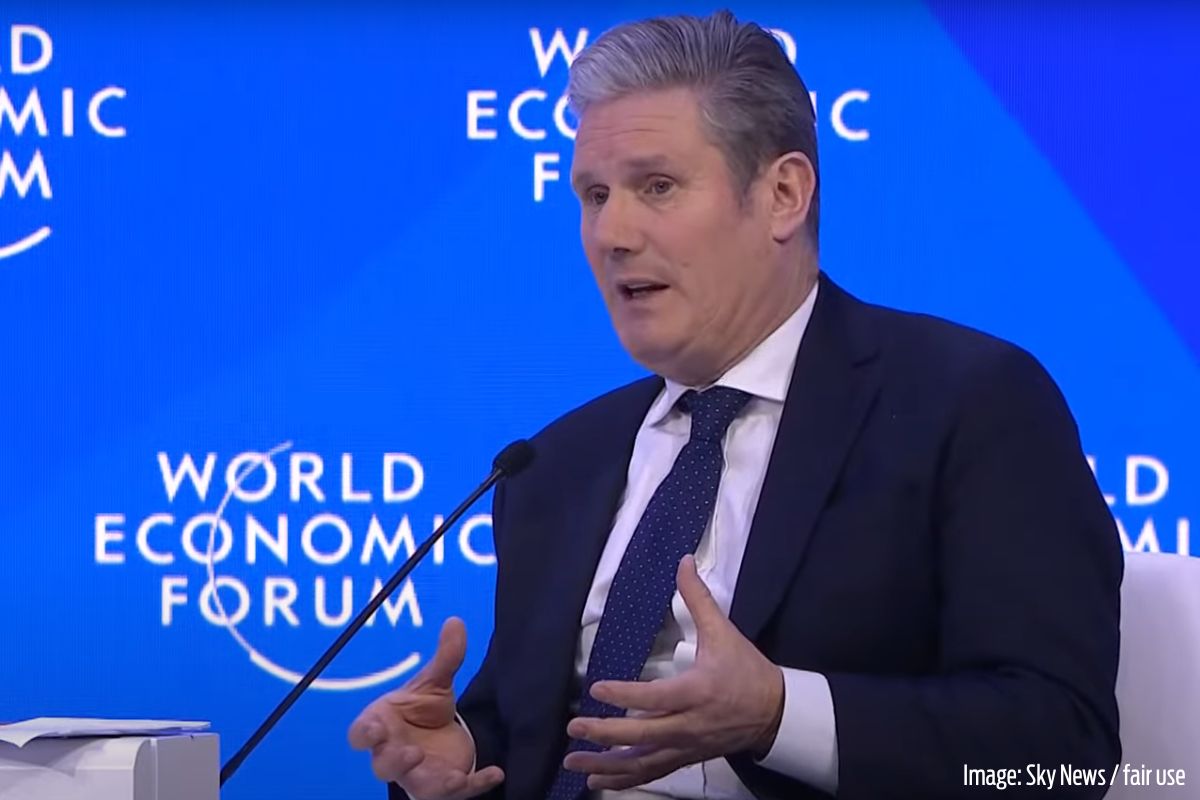Labour leader Keir Starmer and shadow chancellor Rachel Reeves have jetted off to the World Economic Forum (WEF) in Davos, Switzerland, this week, in order to schmooze with the global elites and rub shoulders with the strategists of capital.
This is the latest step in Starmer’s campaign to make it clear to the ruling class that “Labour is back in business”; that the ‘unruly’ days of Corbynism are no more; and that the party is once again a safe pair of hands for managing capitalism, in place of the increasingly discredited Tories.
Knight in shining armour

Following on from their speeches at the last Labour conference, where they emphasised their commitment to “fiscal responsibility” and “restraint”, i.e. austerity and cuts, Starmer and Reeves took to the airwaves this week to stress to the captains of industry that Britain would be “open for business” under their watch.
A Starmer-led government, they assured, would “bring global investors back” and “work in partnership with business”.
And no doubt ‘Sir’ Starmer, the establishment’s knight in shining armour, will have bragged in private to the Davos summit’s attendees – over a bottle of champagne – about his heroic exploits: reprimanding Labour MPs for attending picket lines, and purging socialists from the party.
All of this will be offered as evidence that he is firmly on the side of the bosses, and not the working class.
By contrast, the Labour leader will note how the Tories have presided over economic and political chaos in recent months (and years), with Rishi Sunak’s predecessor, Liz Truss, managing to crash British capitalism into a ditch in her brief tenure as prime minister.
Furthermore, Starmer will likely point with glee to the notable absence at the WEF of Sunak and his chancellor, Jeremy Hunt, as another shining example of why he, and not his Tory counterpart, is most deserving of the backing of the bankers and billionaires.
Soothing words
To calm the nerves of any business leaders not already convinced by Starmer’s credentials, he may well have highlighted the example of Westminster City Council.
A traditionally Tory run council, businesses have openly admitted that they were initially sceptical of the new Labour management.
One property manager, speaking in the Financial Times, said that they had thought to themselves that “We are now under the People’s Republic of Westminster” after Labour took control of the council in last year’s local elections. They needn’t have worried!
After a short time, local bosses quickly warmed to the new council leadership, who made it clear from the get go that they wished for a cosy relationship with business.
Council leader Adam Hug cited Starmer’s ‘pragmatic’ approach towards business as the secret to his party’s success, offering the bosses further soothing reassurances that “we are not revolutionaries”.
Message received

Starmer has made it clear that he is prepared to get his hands dirty in the interests of British capitalism.
Recently, the right-wing Labour leadership has even stated that they are willing to slaughter sacred cows, aiming their sights at Britain’s most cherished institution: the NHS.
Echoing the words of his Blairite shadow health secretary, Wes Streeting, Starmer has stressed the virtues of bolstering the role of the private sector in the health service.
The Labour leaders wrap up their policies with hollow promises that they have no intention of privatising the NHS. But given the immense levels of privatisation and outsourcing that took place under Blair’s New Labour government, in the public healthcare system and beyond, nobody trusts such pledges.
Their message to the bosses is clear: they are prepared to take the axe to one of the most beloved – and fiercely defended – gains of the working class in Britain.
Starmer’s campaign to woo the capitalist class has certainly paid off, with donations from wealthy individuals now surpassing £2 million. The party has also seen a similar increase in donations from businesses.
A large proportion of these new donations, meanwhile, are from previous Tory donors switching allegiance – a sure sign that Starmer’s message to big business is being heard loud and clear.
Class struggle
A Starmer government, however, if elected, would inherit a system deeply embroiled in turmoil and instability. It would be a crisis government from day one.
Always ready, willing, and eager to prostrate himself at the altar of capital, ‘Sir’ Starmer would loyally carry out the programme demanded by the bosses and bankers: one of austerity, privatisation, and attacks against the working class.
Whilst Starmer wines and dines with the global capitalist elites, at what his predecessor Jeremy Corbyn correctly described as a “billionaires’ jamboree”, hundreds of thousands of workers in Britain are being drawn into the class struggle, as the crisis of capitalism deepens.
This bankrupt system cannot be patched up. What is needed is a root-and-branch transformation of society along socialist lines – including the expropriation of all the super-rich delegates at Davos, in order to provide decent jobs, homes, and services for all, and offer a real future to the working class.






